- Home
- Lou Cameron
Stringer and the Hell-Bound Herd Page 14
Stringer and the Hell-Bound Herd Read online
Page 14
But even as he was paying up to light out, the batwings across the way parted to admit a familiar figure in gun-barrel chaps, backed by two other cowhands nearly as tall. Nearly because, on his boot heels, the one and original Chuck Tarington was even taller than he looked in the saddle. He spied Stringer about the same time and swaggered over, saying, “I was just asking about you, MacKail. By what right have you been dogging my tracks like a shit-sniffing coyote? That widow gal back in Dutch Flat got paid for her damn beef, didn’t she?”
Stringer nodded and said, “For which we’ll both be forever grateful. It took her some time to cash the wired money, but all’s well that ends well, and how did you know anyone was following you, Chuck? I don’t mind saying you’re a hard man to catch up with, considering the average speed of a cow.”
Tarington growled, “I’m paid to get stock to its proper destination. As to who’s been keeping tabs on you, I check in by wire every time I pass by a town Western Union ever heard of. Headquarters over to Sacramento told me in Reno you seemed to be tagging after us and wanted to know how come. So how come you’ve been doing that, newspaper boy?”
Stringer smiled innocently and replied, “You just answered your own question by mentioning the trade I follow. My feature editor and I both agreed it seems a mite unusual to drive beef so far and in such odd directions when the Quartermaster Corps is paying top dollar so much closer. So what’s the story, Chuck?”
Tarington scowled down at Stringer, he was really that tall, and announced, “I’ll give your paper an obituary to print if you don’t crawfish out of my existence, pronto, you nosy pain in the ass!”
Stringer told him quietly, but firmly, “I’m paid to be sort of nosy and I wasn’t raised to crawfish. But let’s not get our bowels in an uproar, vaquero mio. Seems to me a man who drives market herds for others, whether for fun or profit, would be proud to have his name spelled right in the San Francisco Sun, unless, of course, he’s been up to something he’d just as soon not advertise.”
“I got nothing to hide, damn your eyes!” Tarington snapped. “If you print any mean things about me in your Frisco rag I’ll sue it bowlegged. That’s after I kick the personal shit out of you, I mean.”
He sounded like he meant it. Stringer was saved from asking when one of the hands with Tarington, and obviously backing his play, murmured, “Oh, oh, looks like more company, boss!” To which Tarington replied just as softly, “I see „em. Get us some beer and let me do all the talking, Ben.”
Stringer had his back to whatever was coming their way and the obvious worry in Tarington’s eyes inspired him to turn his spine to the bar and hook his left elbow on the mahogany, leaving his gun hand ready for anything that happened next.
What happened next was two gents Stringer had seen earlier at a corner table without getting all that upset about either. One looked to be a full blood dressed white enough to get away with ordering drinks in a saloon no matter what Teddy Roosevelt said. The Schofield .45 he packed cross-draw likely helped him get served without much argument as well. The white man with him was dressed more sissy but looked about as tough. He had at least two guns slung under his summerweight seersucker jacket and his almost white straw hat looked rather collegiate for a man of forty-odd years with a moustache many a walrus would have been proud to sport. As the two strangers joined Stringer, Tarington, and the others at the bar, the one under the straw hat opened his jacket to flash a silver badge pinned to the lining as he said, “I’d be U.S. Deputy Joe Lefors and this is my head tracker, Lord Baltimore. I got some questions to ask you, Tarington. For openers, I’d like to know who these three other cusses might be.”
Tarington introduced his two riders as Brazos Ben and Good Old Grits, their chuck wagon boss. When he said Stringer wasn’t with them but mentioned his name in doing so, Joe Lefors fixed Stringer with a poker dealer’s stare and said, “I’ve read your stuff. I can’t say I like being called a liar in print anymore than I like it to my face. Might you like to rephrase what you said about me and the murderous Tom Horn, Mister MacKail?”
Stringer shook his head but smiled and said, “You don’t have to call me mister if I can call you Joe. I’m sorry if you took my article as repudiation of your testimony against old Tom in that Cheyenne courthouse. But I’ll stand by what I wrote and signed and if you’d be good enough to read it over with a cooler head you’d see I never said you were a liar. I only said somebody had to be lying like a rug and that I found it sort of odd a hired gun like old Tom Horn would shoot little boys, free.”
Lefors grimaced and said, “My lawyer told me I didn’t have you on outright libel when I told him I wanted to sue you and your damned paper. Just make sure you never write that mean about me the next time a damned old drunk tells you I framed him. Whether you believe him or not, Tom Horn stands convicted of killing young Willie Nickell and that fool case is closed as far as I’m concerned. Guess who I’m after right now, if you’re so smart.”
Stringer said, “That’s easy. I heard about two train robberies in a row. But don’t you think we’re a mite west of the Wild Bunch, Joe?”
Lefors said, “Call me Deputy Lefors, and the score stands at three right now. They stopped a train near Reno last night.” Then he smiled wolfishly at Chuck Tarington to add, “Tell „em how the sign read, Lord Baltimore.”
The Indian stared at Tarington and his boys saying, “Hear me, four men with feed sacks over their heads entered the baggage car. They rode off aboard eight ponies. Maybe some of them were pack ponies. They left with twenty thousand dollars, all silver. That is a lot of silver to carry at full gallop aboard only eight ponies!”
Lefors said, “Figuring sixteen dollars to the pound it do add up. But tell „em about the tracks, Lord Baltimore.”
The Indian said, “There were no tracks leading far enough from the place they stopped the train to matter. Hear me, I followed them easy, easy, until some damned white men drove more than a thousand head of cattle across the hoofprints left by eight ponies!”
Joe Lefors smiled thinly at Chuck Tarington as he chimed in with, “Same thing happened with both earlier train robberies. Indescribable sons of bitches with feed sacks instead of faces riding off just far enough for a heap of cows to run over „em or at least their tracks. It makes one wonder, don’t it?”
Chuck Tarington frowned harder at the lawman than he had at Stringer, demanding, “Are you hinting me and my boys have been sticking up trains along the way to Wagon Springs?”
Lefors snorted derisively and replied, “Hinting shit, I’m saying outright that me and Lord Baltimore would like a look around your camp and, whether we find anything or not, you’re not to move one mile farther with that crew of pickup riders until I’m satisfied none of „em are knowed associates of anyone I’ve ever arrested in my time.”
He added with a chuckle that he’d been around some time. Tarington protested, “So have I and, damn it, Deputy, you know I don’t have a record as a train robber! I’d know if any of my boys had lit out on errands of their own, which they ain’t, and I can’t hold that herd on the bedding grounds just off to the north because there may be water, but there ain’t no grass.”
Lefors soothed, “I’m sure you can rustle up some feed grain for „em, this close to the railroad tracks.” To which Tarington almost sobbed in reply, “With what? Have you any notion what it costs to grain-feed close to two thousand cows at today’s prices?”
Lefors said, cheerfully, “I don’t have to worry about feeding cows. I only deal with crooks. So about that shakedown inspection…”
“You’re out of line and I’ll stand by that in the San Francisco Sun,” Stringer cut in, inspiring both Lefors and Lord Baltimore to stare at him with renewed distaste. The federal lawman tried for a sweet smile, looking sweet as a wolverine contemplating an unguarded henhouse as he purred, “I still owe you for that shit you put in the papers about me, if you’d like to deal yourself a hand in this game, sonny.”
Stringer said
, “Bullshit. You go off as half-cocked at me as you did poor Tom Horn and you’ll really wind up famous. Neither my feature editor nor the owners of my big town newspaper are afraid of you, either, and should push come to shove I can prove where I was, and it wasn’t along the Western Pacific right of way when this rash of train robberies broke out.”
Having failed at bluster Lefors soothed, “I never said you were a member of the Wild Bunch, boy. I read your piece on the death of Kid Curry and anyone can see you were with the posse, not him, when he did us all the favor of blowing his own limited brains out. So what in thunder’s got you riled at me, for land’s sake?”
Stringer replied, evenly, “For openers I don’t like bullies and I haven’t been afraid of „em since I was a very small boy. I can’t say I admire this other born bully here, but fair is fair and I’d like to see you work for a conviction for a change. You don’t get to pin the first train robbery on old Chuckaroo because I was between him and the train robbers, with witnesses as well as a clear conscience when they robbed the fool train.”
Lefors grumbled, “I know exactly where everyone of any importance might have been during each and every one of them recent train robberies.” So Stringer pointed out, “I can read, too. Unless Western Pacific is handing out false press releases, Chuckaroo here is off the hook for the one in Donner Pass as well. He was in Dutch Flat, threatening to clean my plow on the night in question.”
As Lefors swung his gunmuzzle eyes on Tarington the bluff drover grinned like a mean little kid and said, “That’s right! The two of us have some armed and dangerous Mexicans to prove it if you try to say we were secret lovers in cahoots against the railroad! I confess this runty newspaperboy let us down a mite when we come calling at midnight loaded for bear. But you can ask anyone down Dutch Flat way if we didn’t leave there, with our original beef and some extra Placer County cows, well after the time of that train robbery up to Donner Pass!”
Lord Baltimore looked disgusted and said, “Hear me, your herd left many tracks, many. That made me very cross with all you white riders. The train robbers left a clear trail west down from the pass. The earth was soft in places. It was easy enough to follow where they tried to fool me by crossing slick rock. Then the trail I was following met the bigger one, bigger, left by all your damned cows!”
Lefors added, “Leave us not forget he just said the trails met, not that they crossed!”
Lord Baltimore nodded soberly and said, “That is true. Hear me, I scouted for sign on the far side of the wide path the eastbound herd cut up and over the pass. I found nothing, nothing. The only way it works is that after they stopped the train and rode off heavily-laden with all that specie, they fell in with Tarington here. Maybe he knew they’d just robbed a train. Maybe he didn’t. I have spoken.”
Chuck Tarington looked as if he was stuck for a sensible reply. So Stringer said, “Let’s see if I can tell you where you went wrong, Lord Eagle Eye. Would you agree a hoofprint is a hoofprint, whether left by cow or pony, and that neither critter knows how to record the time of night or day as it moseys along in any damned direction?”
The Indian asked if Stringer was trying to mock him. Stringer said he wasn’t trying and continued, “No matter how the hoofprints read it’s been established old Chuck’s outfit took no part in one train robbery. Someone working for Western Pacific surely would have said so by now if they’d noticed over a thousand head of beef in the vicinity.”
Lord Baltimore growled, “Hear me, you are buzzing in our ears like a buffalo gnat with nothing to say! Nobody here accused any cows of holding up a train! The masked outlaws who did it used the herd of their confederate here to cover their tracks!”
Chuck Tarington let out a howl of displeasure. Stringer told him to stuff a sock in it and said, “You’d have a time proving that in court with a full confession as self-incriminating as that one Tom Horn swears he can’t remember making. I’m not a lawyer but I could still cut you to ribbons if I had anyone on the jury who’s ever done a lick of tracking.”
By this time the Tarington rider called Ben had gotten more beer out of the management for his side, apparently including Stringer as a Tarington rider. So Joe Lefors signalled the barkeep for two more as he purred at Stringer, “Cut me to ribbons, lawyer boy.”
Stringer clinked his beer schooner with Ben and told Lefors, “I’ll buy the chief here picking up exactly the sign he claims he did. It’s how you read sign that counts. Let’s say the outlaws knew a big herd was coming their way. If even one of them had ever herded cows he could figure the natural route they’d take.”
“Nobody’s accused any cows of climbing trees,” Le-fors conceded. “Get to the damn point.”
Stringer sipped some suds and said, “Knowing a heap of cows would soon be along to cover their tracks, the robbers knew it hardly mattered what sort of tracks they left as they rode this way and that. They split up gradual, or, that is to say, one rider peeled off here and another there, some riding towards the oncoming herd whilst others doubled back on their trail. Anyone coming along about then would have been able to read where they’d agreed to divvy up and meet later for the next job. But once close to two thousand head had plowed and shit all over their tracks for many a mile…”
Lefors turned to Lord Baltimore, growling, “How about that, Chief? Could you swear in court to no tracks entering or leaving the torn-up cattle trail unaccounted for?”
The Indian looked disgusted and said, “Hear me, they’ve driven the damned cows most of the way within pistol shot of the tracks and service roads. Of course there were hoofprints, plenty of hoofprints, leading every way, but as I told you before, no sign of eight or even two ponies moving side by side, so…”
“So this newspaperboy has a point,” Lefors cut in, trying to smile at Stringer but not quite making it. “All right. You’re so damned smart. Where do you think those train robbers went if they didn’t join up with Tarington here?”
Stringer smiled back and said, “Elsewhere. My paper never sent me to cover those robberies. So you know more about „em than I do and if you can’t say, well, I just told you I’d like to see you work at it for a change, Sherlock Holmes.”
“Jesus H. Christ, I’d rather be called Joe,” Lefors said. “Just listening to you, MacKail, a body could get the distinct notion you’re rooting for the Wild Bunch rather than the forces of Law and Order.”
Stringer shook his head and said, “Not hardly. I doubt the Wild Bunch I fell in with that time could be working this far west and whether they are or not I’d hardly root for anyone who killed honest men on or off a baggage car full of dinero.”
“Then why don’t you want to help us?” Lefors asked in an injured tone. So Stringer said, “I’d be proud to, if I had any notion who and where the train robbers might be, and if I thought you’d work at it instead of simply hanging any tattered shred of circumstantial evidence on any saddle tramp handy.”
Lefors thundered, “Tom Horn was guilty of killings too numerous to mention and if he didn’t murder Willie Nickell, somebody did, and nobody can say Tom Horn didn’t have a hanging coming!”
Deputy Marshal Lefors didn’t seem to get it when Stringer told him dryly that such logic was hard to argue with. He told Chuck Tarington, “I got my eye on you, too!” and grumped back to his table with Lord Baltimore carrying both their beer schooners.
Chuck Tarington let out his breath and wheezed, “I’m sure glad we didn’t get to shoot it out that time in Dutch Flat, MacKail. What would you do now, if you was me?”
Stringer shrugged and said, “Since you ask, I’d load all that beef aboard the first westbound that’d take it and get it back out to Frisco while the price out there’s at an all-time high. I assume you’re still being stubborn about that, though?”
Tarington said, “I ain’t all that stubborn. I got no choice. Great Basin Beef Incorporated is paying me to get the beef to Wagon Springs as per our agreement. The price once I get it there ain’t no never mind of min
e. Wouldn’t you agree that pesky federal man just let us off the hook by huffing off without setting an exact time for that inspection he was jawing about before?”
Stringer looked innocent and replied, “I don’t recall him telling anyone outright whether they should leave or stay, and you’ll never have a better time for a desert drive than now. Would it be asking too much if I was to ask if I could sort of tag along and record such a colorful event for, say, a Sunday feature, Chuckaroo?”
Tarington asked if Stringer knew how to turn a stampede and when Stringer allowed he knew how to try, at least, Tarington said, “Then finish your beer and don’t never call me Chuckaroo again if you aim to ride along with me and my boys.”
CHAPTER THIRTEEN
It was more than a mite confusing for Stringer to ride into a cow camp late at night, be introduced all around to an indeterminate number of dark forms, and then find himself riding drag by starlight behind a herd he couldn’t quite make out in what seemed to be the wrong direction.

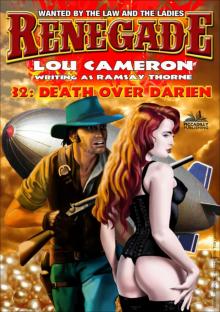 Renegade 32
Renegade 32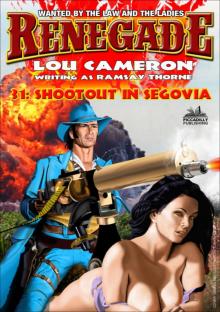 Renegade 31
Renegade 31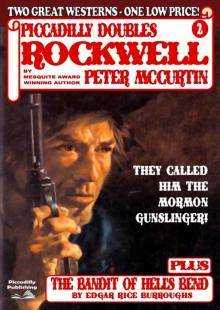 Piccadilly Doubles 2
Piccadilly Doubles 2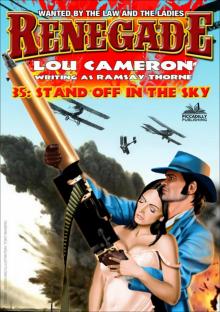 Renegade 35
Renegade 35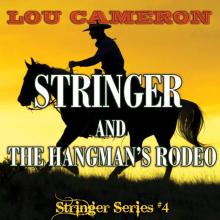 Stringer and the Hangman's Rodeo
Stringer and the Hangman's Rodeo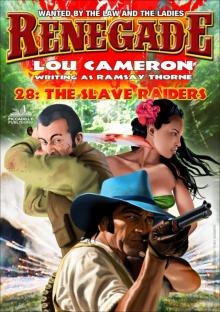 Renegade 28
Renegade 28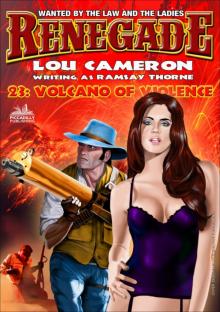 Renegade 23
Renegade 23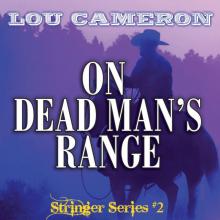 On Dead Man's Range
On Dead Man's Range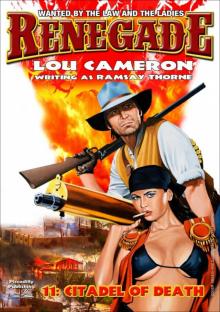 Citadel of Death (A Captain Gringo Western Book 11)
Citadel of Death (A Captain Gringo Western Book 11)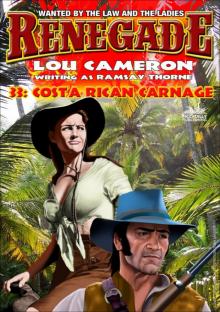 Renegade 33
Renegade 33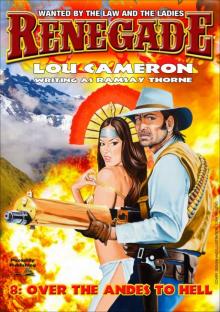 Over the Andes to Hell (A Captain Gringo Western Book 8)
Over the Andes to Hell (A Captain Gringo Western Book 8)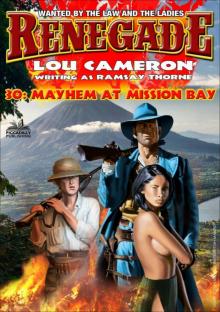 Renegade 30
Renegade 30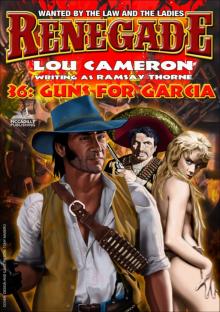 Renegade 36
Renegade 36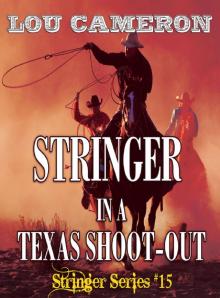 Stringer in a Texas Shoot-Out
Stringer in a Texas Shoot-Out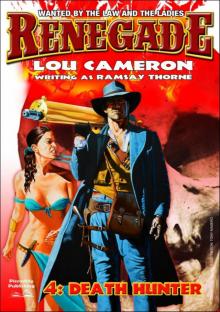 The Death Hunter
The Death Hunter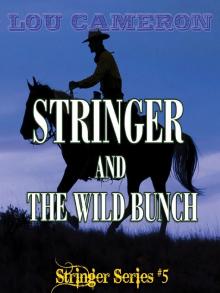 Stringer and the Wild Bunch
Stringer and the Wild Bunch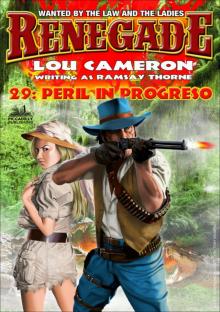 Renegade 29
Renegade 29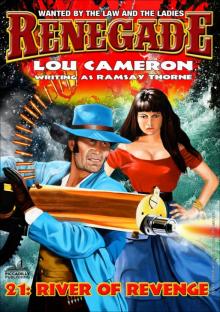 Renegade 21
Renegade 21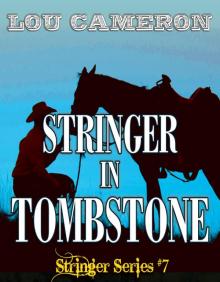 Stringer in Tombstone
Stringer in Tombstone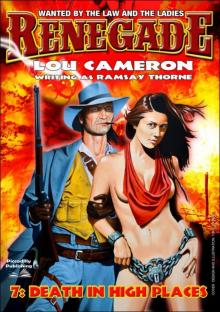 Death in High Places (A Renegade Western Book 7)
Death in High Places (A Renegade Western Book 7)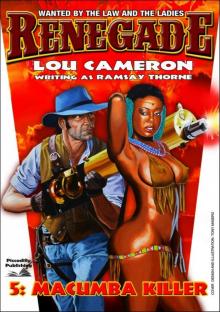 Macumba Killer
Macumba Killer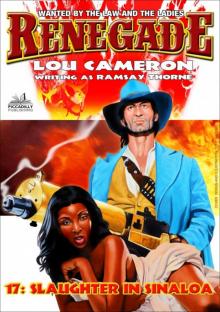 Renegade 17
Renegade 17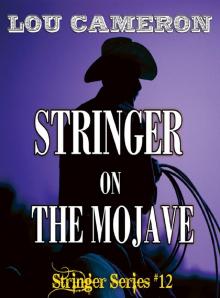 Stringer on the Mojave
Stringer on the Mojave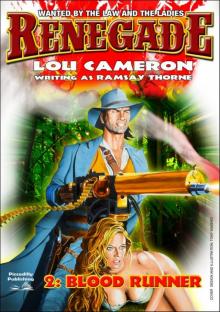 Blood Runner
Blood Runner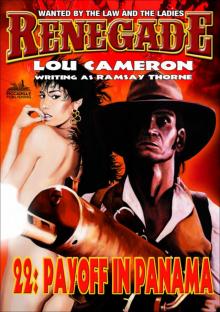 Renegade 22
Renegade 22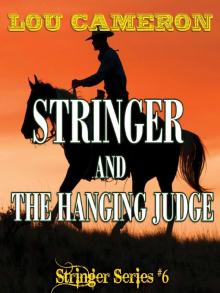 Stringer and the Hanging Judge
Stringer and the Hanging Judge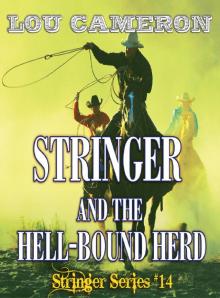 Stringer and the Hell-Bound Herd
Stringer and the Hell-Bound Herd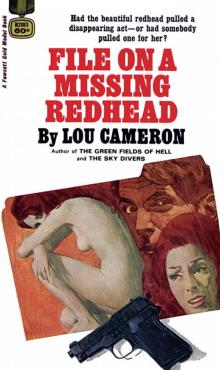 File on a Missing Redhead
File on a Missing Redhead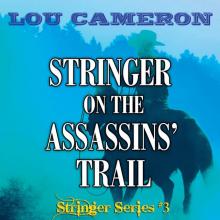 Stringer on the Assassins' Trail
Stringer on the Assassins' Trail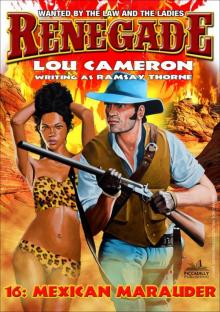 Mexican Marauder (A Captain Gringo Adventure #16)
Mexican Marauder (A Captain Gringo Adventure #16)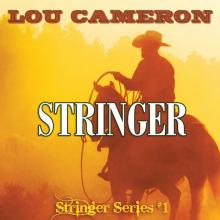 Stringer
Stringer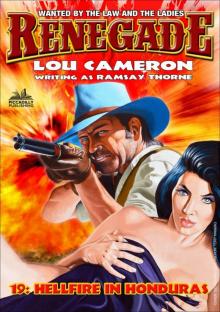 Renegade 19
Renegade 19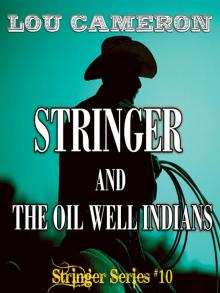 Stringer and the Oil Well Indians
Stringer and the Oil Well Indians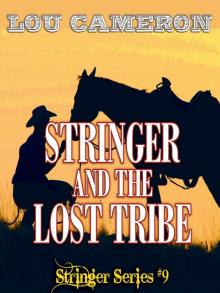 Stringer and the Lost Tribe
Stringer and the Lost Tribe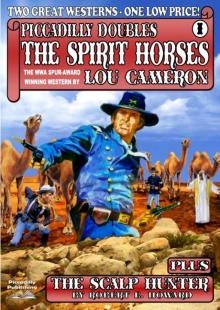 Piccadilly Doubles 1
Piccadilly Doubles 1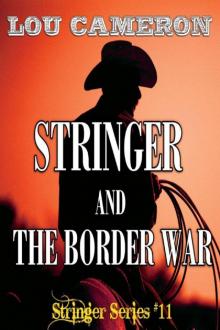 Stringer and the Border War
Stringer and the Border War Renegade
Renegade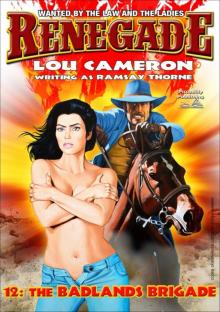 The Badlands Brigade (A Captain Gringo Adventure Book 12)
The Badlands Brigade (A Captain Gringo Adventure Book 12)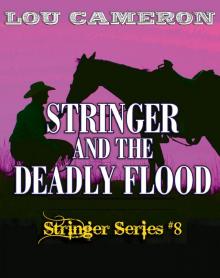 Stringer and the Deadly Flood
Stringer and the Deadly Flood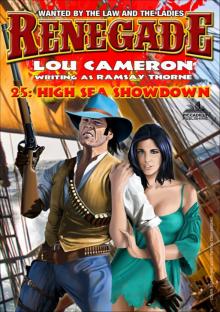 Renegade 25
Renegade 25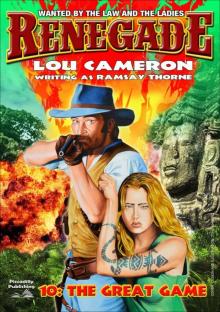 The Great Game (A Captain Gringo Western Book 10)
The Great Game (A Captain Gringo Western Book 10)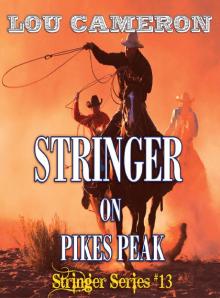 Stringer on Pikes Peak
Stringer on Pikes Peak